Dear StrongStart families,
Here is a post from our community partner Anita Olsen. Let us SERVE AND RETURN!
As the Early Childhood Community Consultant in Burnaby, I absolutely love visiting the outdoor StrongStart programs. There is something almost magical about the outdoor exploration that happens when parents/caregivers and their children connect with one another.
I spend a lot of time talking about the need children have to feel connected to the big people in their immediate world (mom, dad, grandpa, grandma, or whoever makes up your immediate “family”). When children feel connected to their big people they feel safe and secure, and when children feel safe and secure, they learn that the world is a safe place to explore and learn in. Feeling connected to their big people helps them feel important, and a child who feels important is gaining self-confidence and acts on their curiosity to explore. A child who feels connected to their big people feels that they are listened to and understood – and children who are listened to and understood are far more likely to listen to others (even their big people) and practice empathy.
Being connected with our children through outdoor play offers countless opportunities to engage in what leading researchers at Harvard’s Centre on the Developing Child refer to as, “serve and return” interactions.
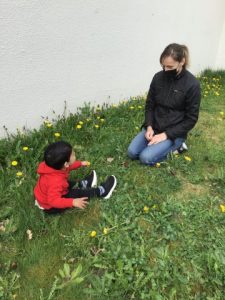
For the most part, these are everyday interactions that can happen anytime and in any place. They are back and forth exchanges based on a child’s interest – a child “serves” by showing an interest in something and the adult “returns” that “serve” by responding in a supportive way. Here’s a great example of a “serve and return” interaction.
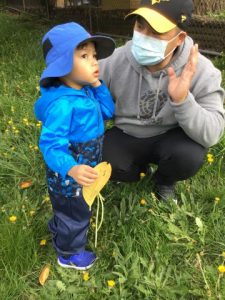
In this picture, L. shows an interest in the distant sound of a train’s horn, this is his “serve”. Dad “returns” this “serve” by first sharing the focus with L. , he pauses and listens to the train’s horn with his son. Dad continues to return L’s serve by naming the sound, “Yeah, you hear the train”. By naming what our children are seeing, hearing, doing or feeling helps them make understanding of the world around us and what to expect from it – not to mention all that language development it fosters. L. responds to his dad with a train sound – now they are taking turns and L. gets to practice self-control and how to relate to others, in this case his dad. When dad is waiting, giving L. a chance to respond, L. has the opportunity to develop more ideas, build up confidence and independence. Finished with the train’s horn, L. goes back to his leaf collection and dad offers a hand when the leaves are too high.
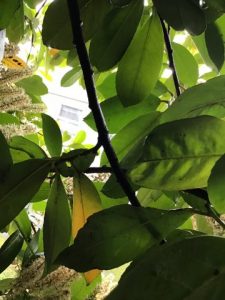
In those moments we practice ending and beginning – when we can find these moments for our children to take the lead we can fully support them in exploring their world and make more serve and return interactions possible.
Strong Starts are there to facilitate the connection of the parent/caregiver and child relationship – for them to engage in these “serve and return” interactions.
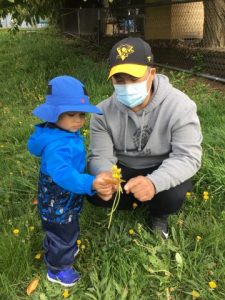
Unfortunately, we don’t live at Strong Start and life is full. Now, if we were able to return every single serve that our child gives us a) we would be absolutely exhausted and b) we’d be robbing them of full human condition! Disappointment or frustration is a natural part of life. Sometimes we may miss a “serve” and that’s okay, there will be more to return. Sometimes our return to a serve isn’t what our little one has in mind and gets upset, this is okay too.
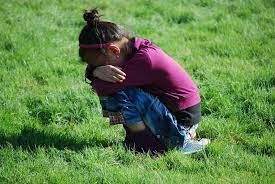
If time is up at Strong Start and your little one serves you with “I don’t want to leave!!!” it doesn’t mean that your “return” has to comply – what it needs to do is exactly the same as what L. and his dad practiced. Share the focus – here the focus is on not wanting to leaving the park. Then you name it – “Sounds like you’re feeling upset the time is up” and wait to see how they respond. Asking a question about what they liked best or if they could stay all day what would they wish to do, can help get into some turn taking – remember, give them the chance to respond. As you move through this with them, honour the ending of the time and associated feelings. Endings can be really hard, and they need practice too.
Share the focus – pay attention to what they find interesting (or hard)
Support and encourage – name it (what they see, hear, feel, do…). Take turns – wait to see how they respond.
Practice endings and beginnings.
If you would like more detailed information about “serve and return” I highly recommend checking out the Harvard University Centre on the Developing Child.
I look forward to visiting again!
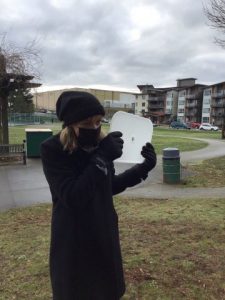
Anita Olson (she/her) ECE, BA, MEd
Early Childhood Community Consultant
M 604 723 9548
3rd Floor – 321 Sixth Street, New Westminster BC V3L 3A7

Leave a Reply